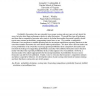246 search results - page 25 / 50 » The Truth About Defaults |
JAPLL
2007
13 years 9 months ago
2007
We propose a novel method of determining the appropriateness of an answer to a question through a proof of logical relevance rather than a logical proof of truth. We define logic...
SEMWEB
2010
Springer
13 years 7 months ago
2010
Springer
RDF(S) and OWL 2 currently support only static ontologies. In practice, however, the truth of statements often changes with time, and Semantic Web applications often need to repres...
SYNTHESE
2010
13 years 4 months ago
2010
Most scientific models are not physical objects, and this raises important questions. What sort of entity are models, what is truth in a model, and how do we learn about models? In...
MANSCI
2007
13 years 9 months ago
2007
Probability forecasters who are rewarded via a proper scoring rule may care not only about the score, but also about their performance relative to other forecasters. We model this...
KDD
2009
ACM
14 years 10 months ago
2009
ACM
Classifying nodes in networks is a task with a wide range of applications. It can be particularly useful in anomaly and fraud detection. Many resources are invested in the task of...

